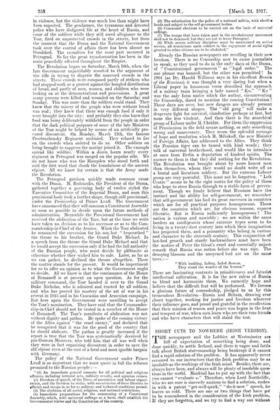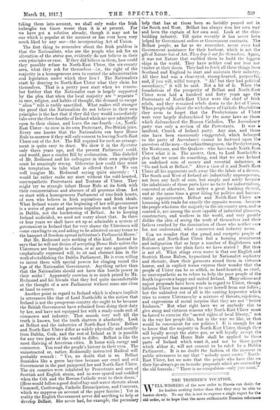SHORT CUTS TO NOWHERE (IRISH VERSION). T HE newspapers and the
Lobbies at Westminster are full of expectation of something being done, and done quickly, to settle Ireland, and there is vague and futile talk about British statesmanship being bankrupt if it cannot find a rapid solution of the problem. It has apparently never occurred to our instructors that the Irish problem may be as insoluble as the workings of the Irish mind. Besides, there are, always have been, and always will be plenty of insoluble ques- tions in the would. Mankind has to put up with the fact that you cannot "evaluate Ir." Therefore, when Lord Northcliffe, who we are sure is sincerely anxious to find a solution, rushes in with a patent "get-well-quick," " do-it-now " speech, he leaves us cold. There are one or two things that have got to be remembered in the consideration of the Irish problem. If they are forgotten, and we try to find a way out without taking them into account, we shall only make the Irish imbroglio ten times worse than it is at present. For we have got a solution already, though it may not be one which is popular at the moment or has ever been very much liked by any one—the incorporating Act of Union.
The first thing to remember about the Irish problem is that the Nationalists, who are the people who ask for an alteration of the status guo, evidently do not believe in their own principles or case. If they did believe in them, how could they possibly refuse to North-East Ulster, the six-county area, what they ask for themselves—i.e., the right of the majority in a homogeneous area to control the administration and legislation under which they live Tho Nationalists start by denying to North-East Ulster what they claim for themselves. That is a pretty poor start when we remem- ber further that the Nationalist case is largely supported by the plea that when the local majority are " separate " in race, religion, and habits of thought, the demand to escape " alien " rule is trebly sanctified. What mikes still stronger the proof that the Nationalists do not believe in their own principles is the fact that if they did they would immediately take over the three-fourths of Ireland which are now admittedly open to their claims, and leave the one-fourth—i.e., North- East Ulster—to stew in its own Protestant, Pro-British juice. Every one knows that the Nationalists can have Home Rule to-morrow if they will only consent to leaving North-East Ulster out of the Act. The Bill required for such an arrange- ment is quite easy to draw. We drew it in the Srectator only three years ago, and the present Parliament could, and would, pass a similar Bill by acclamation. This disbelief of Mr. Redmond and his colleagues in their own principles must be amazingly strong. Otherwise how could they resist the temptation to take what is offered them ? We can well imagine Mr. Redmond saying quite sincerely : I would far rather make my start without the cold-hearted, unsympathetic Protestants and Teutons of Ulster. They might try to strangle infant Home Rule at its birth with their commercialism and absence of all generous ideas. Let us start with a homogeneous Parliament of true Irish hearts, of men who believe in Irish aspirations and Irish ideals. What Ireland wants at the beginning of her self-government is a series of great and generous impulses such as they have in Dublin, not the huckstering of Belfast. As to keeping Ireland undivided, we need not worry about that. In three or four years we shall have set up so admirable a system of government in Ireland that for very shame the Ulstermen will come crawling to us, and asking to be admitted on any terms to the banquet of freedom spread in Grattan's Parliament House.' But Mr. Redmond says nothing of this kind. Instead he says that he will not dream of accepting Home Rule unless the Ulstermen are brought in chains, or at any rate against their emphatically expressed will, to sit and obstruct him in the work of establishing the Dublin Parliament. He is even willing to invest them with special powers for clinging round the legs of the Nationalist Government. Anything rather than that the Nationalists should not have this hostile power in their midst ! Apparently coercion is so much prized by Mr. Redmond and his friends that they feel quite uncomfortable at the thought of a new Parliament without sonic one close at hand to coerce.
Another point in regard to Ireland which is always implicit in utterances like that of Lord Northcliffe is the notion that Ireland is not the prosperous country she ought to be because the British Government have refrained from doing their duty by her, and have not equipped her with a ready-made suit of commerce and industry. That sounds very well till the truth is known, but the truth shatters it absolutely. Look at Belfast and the industries of North-East Ulster. Belfast and North-East Ulster differ as widely physically and morally from Dublin, Cork, and the rest of Ireland as it is possible for any two Parts of the world to differ. Belfast is like the most thriving of American cities. It hums with energy and commerce. You read the people's history in their eyes. The uninstructed or, rather, Redmondly instructed Radical will probably remark : " Yes, no doubt that is so. Belfast nourishes like a green bay-tree because our cruel and evil Government in the past pampered her and North-East Ulster. The six counties were inhabited by Protestants and men of Scottish and English strain, and so were spared and coddled when the Celt and the Roman Catholic went to their doom." Here would follow a good deal of hay-and-water rhetoric about Cromwell, Castlereagh, Catholic Emancipation, and Convents, which we suppress on account of the paper famine.] Yet m reality the English Government never did anything to help or develop Belfast. She never had, for example, the pecuniary help that has at times been so lavishly poured out in the South and West. Belfast has always won her own way and been the captain of her own soul. Look at the ship- building industry. Till quite recently it has never been helped by Government orders or Government contracts. The Belfast people, as far as we remember, never even had Government assistance for their harbour, which is not the gift of Nature but of Art. They dug it out for themselves. Again, it was not Nature that enabled them to build the biggest ships in the world. They have neither coal nor iron nor timber at their doors. They had to fetch all these things from Scotland and England to start and maintain their industry. All they had was a clear-eyed, strong-hearted, purposeful, and, if you will, wilful temper. " Ali! but they had political ascendancy," it will be said. Not a bit of it. When the foundations of the prosperity of Belfast and North-East Ulster were laid a hundred and forty years ago the Protestants of North-East Ulster were the chief of Irish rebels, and they remained rebels down to the Act of Union. When people talk about the wickedness of Catholic Disabilities they seem to forget that the Presbyterians of Ulster were very largely disfranchised by the same laws as those which disfranchised the Roman Catholics. The Ascendancy party was only a section of the Protestants. It was a landlord, Church of Ireland party. Any sins, and those sins have been enormously exaggerated, which belonged to the party of Ascendancy cannot be fastened upon the ancestors of the men—the urban Orangemen, the Presbyterians. the Wesleyans, and the Quakers—who have made North-East Ulster what it is. The answer, then, to Lord Northcliffe's plea that we must do something, and that we owe Ireland an undefined sum of money and essential industries, is "Go and look at Belfast." After a view of it. and North-East Ulster all his arguments melt away like the fabric of a dream. The South and West of Ireland arc industrially unprosperous, not from any fault of ours, but simply and solely because the inhabitants of those parts have no taste for industrialism, concerted or otherwise, but rather a great loathing thereof, and at the same time a great liking for politics and bureau- cratic appointments. Belfast and North-East Ulster are humming with trade for exactly the opposite reason--because the people who form the majority in the six-county area, and so control it, are among the most capable of industrial planners, constructors; and workers in the world, and very greatly dislike the idea of seeing the work of themselves and their fathers crushed by the domination of those who neither care for, nor understand, what commerce and industry mean.
Can we wonder that the proud and energetic people of Belfast and North-East Ulster feel a burning resentment and indignation that so large a number of Englishmen and Scotsmen ignore the plain facts we have stated ? But that is not all. What stings even worse is that our English and Scottish Home Rulers, hypnotized by Nationalist sophistry and rhetoric, draw their garments round them in virtuous horror, and in explicit terms express their wonder that the people of Ulster can be so selfish, so hard-hearted, so. cruel, so unsympathetic as to refuse to help the poor people of the South to govern a happy and united Ireland. Many odious and unjust proposals have been made in regard to Ulster, though hitherto Ulster has managed to save herself from our follies ; but the unkindest cut of all is the canting hypocrisy which tries to coerce Ulstermen by a mixture of threats, cajoleries, and expressions of moral surprise that they are not " better Irishmen." But what right have we or anybody else to give smug and virtuous reasons why North-East Ulster must be forced to exercise the "sacred rights of local liberty," not in the way her people like, but in the way we like, or that would be convenient for our polities ? It is enough for us to know that the majority in North-East Ulster, though they will loyally accept the status quo, or will loyally accept the new proposal that Home Rule shall be applied to those parts of Ireland which want it, and not to those parts which abhor it, will not consent to be ruled by a Dublin Parliament.. It is no doubt the fashion of the moment in public utterances to say that " nobody must coerce " North- East Ulster, but we note that the people who have this on their lips always go on to make proposals which are covered by the old formula : " There is no compulsion—only yon must.'



























 Previous page
Previous page